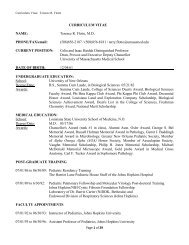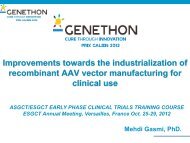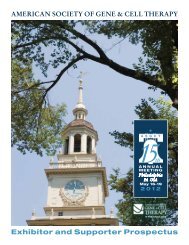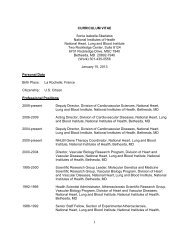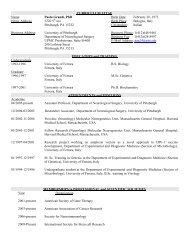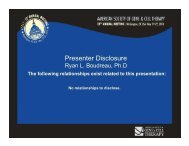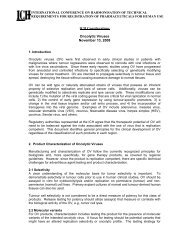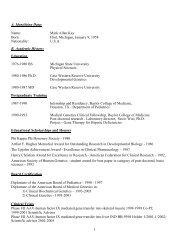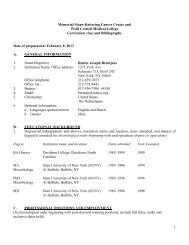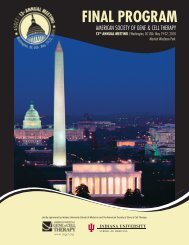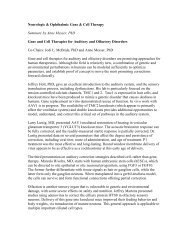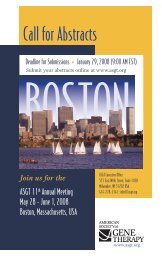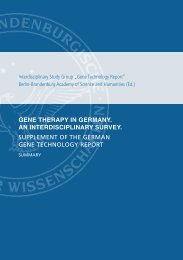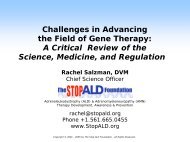Final Program - American Society of Gene & Cell Therapy
Final Program - American Society of Gene & Cell Therapy
Final Program - American Society of Gene & Cell Therapy
You also want an ePaper? Increase the reach of your titles
YUMPU automatically turns print PDFs into web optimized ePapers that Google loves.
<strong>Program</strong> Schedule, Friday, May 17, 2013<br />
Scientific Symposium 316<br />
9:45 am - 11:45 am<br />
ROOM: 150 ABC<br />
Partially supported by the Juvenile Diabetes Research Foundation.<br />
<strong>Gene</strong> and <strong>Cell</strong> <strong>Therapy</strong> for Diabetes<br />
CO-CHAIRS: Nicola Brunetti-Pierri, MD and Lawrence C. Chan, MD<br />
SPEAKERS<br />
H. Teresa Ku, PhD<br />
Pancreatic Stem and Progenitor <strong>Cell</strong>s<br />
Adult pancreatic stem and progenitor cells are potential unlimited sources <strong>of</strong> beta cells, however their existence is highly<br />
controversial. To address this issue, we report here the establishment <strong>of</strong> two in vitro pancreatic colony assays that enable<br />
quantitative measurement <strong>of</strong> self-renewal and differentiation at a single cell level, which is required to deinitively demonstrate<br />
progenitor cell activities. We ind that single pancreatic colony-forming cells are capable <strong>of</strong> self-renewal in the presence <strong>of</strong> Matrigel<br />
and a Wnt signaling agonist, and can differentiate into ductal-like cells (in the presence <strong>of</strong> Matrigel) as well as endocrine and acinar<br />
lineage cells (in the presence <strong>of</strong> an unique laminin hydrogel) in culture. These results demonstrate robust pancreatic progenitor cell<br />
activities in vitro. Our results call for further investigation <strong>of</strong> progenitor cells in the adult pancreas in vivo, a research activity that<br />
has largely ceased after a series <strong>of</strong> recent publications reporting negative indings.<br />
Lawrence C. Chan, MD<br />
<strong>Gene</strong> <strong>Therapy</strong> to Reverse Autoimmune Type 1 Diabetes<br />
Type 1 diabetes (T1D) happens when most <strong>of</strong> the body’s pancreatic beta cells are destroyed by autoimmunity. Therefore, to reverse<br />
diabetes in T1D patients, we need to [1] re-establish suficient beta cell mass, and [2] neutralize the effects <strong>of</strong> autoimmunity. Our<br />
laboratory has developed a strategy that couples gene therapy-mediated induction <strong>of</strong> new beta cell formation in the liver with an<br />
immunomodulatory regimen that protects the neo-beta cells from autoimmune destruction. This strategy successfully reverses<br />
diabetes in an autoimmune model in rodents; the concept <strong>of</strong> therapeutic hepatic islet induction may also work in nonhuman<br />
primates.<br />
Andrea Ballabio, MD<br />
Rescue <strong>of</strong> Fat Diet-induced Obesity and Diabetes by TFEB-mediated Regulation <strong>of</strong> Autophagy and Lipid<br />
Catabolism<br />
The lysosomal-autophagic pathway is activated by starvation and plays an important role in both cellular clearance and lipid<br />
catabolism. However, the transcriptional regulation <strong>of</strong> this pathway in response to metabolic cues is currently uncharacterized.<br />
Here we show that the transcription factor EB (TFEB), a master regulator <strong>of</strong> lysosomal biogenesis and autophagy, is induced by<br />
starvation through an autoregulatory feedback loop and exerts a global transcriptional control on lipid catabolism via PGC1α and<br />
PPARα. Thus, during starvation a transcriptional mechanism links the autophagic pathway to cellular energy metabolism. Viral<br />
delivery <strong>of</strong> TFEB to the liver rescued obesity, diabetes and the metabolic syndrome in both diet-induced and genetic mouse models<br />
<strong>of</strong> obesity, suggesting a novel therapeutic strategy for disorders <strong>of</strong> lipid metabolism.<br />
Friday, May 17, 2013<br />
Markus Grompe, MD<br />
Reprogramming Gall Bladder to make Insulin<br />
Lunch Break (On Own - Not Provided; Pre-ordered boxed lunches available for pick up at Registration Counter)<br />
11:45 am - 1:00 pm<br />
Oral Abstract Session 320<br />
1:00 pm - 3:00 pm<br />
ROOM: BALLROOM A<br />
DNA Vectorology & <strong>Gene</strong> Targeting<br />
CO-CHAIRS: Matthew Hirsch, PhD and Carol H. Miao, PhD<br />
(Abstracts 266 through 273; see page 108)<br />
<strong>Final</strong> <strong>Program</strong> SALT LAKE CITY, UTAH May 15–18, 2013<br />
63



